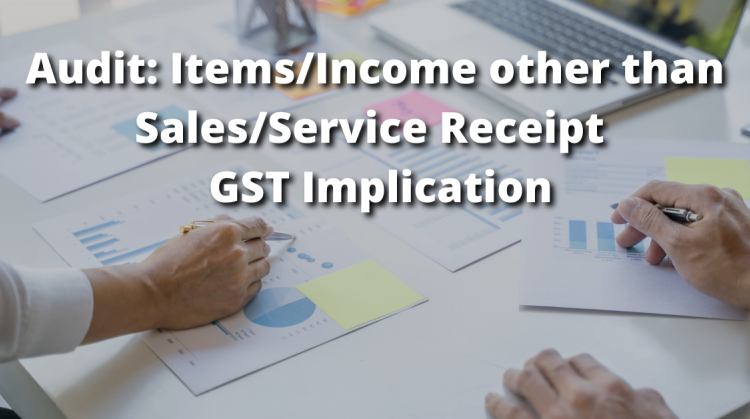There are many items which has different treatment in Income tax v/s treatment under GST Laws. So while auditing we should careful about the same.
As per charging section of GST act, GST shall be levied on supplies of goods or services or both, except on the supply of alcoholic liquor for human consumption. Supply defined in Section 7 of CGST which briefly states that “Supply includes all forms of supply of goods or services or both such as sale, transfer, barter, exchange, license, rental, lease or disposal made or agreed to be made for a consideration by a person in the course or furtherance of business”.
So while checking whether any receipt is liable to GST or not, we need to check whether it shall be considered as supply as per GST act or not. If yes, then we need to pay GST as per GST laws on it.
Following are the most common items which need to be considered:
1. Rental Income:
- Commercial Property: Rental income from commercial property is supply and liable to GST.
- Residential Property: Rental income from residential property is also supply and covered under GST although the same has been exempted from GST.
2. Interest Income:
- Interest Income on Credit Cards –Covered under supply so GST shall be chargeable to it.
- Interest income other than Interest on Credit Cards:
- It includes interest income from Bank Saving account, Bank FDR, NPS Interest, NSC Interest, Post Office Deposits Interest, PF Interest and any other Interest income for any advance/deposit/debentures.
- It is included in supply so covered under GST although the same has been exempted wide Notification No. 12/2017-Central Tax (Rate) dated 28/06/2017.
3. Income from Partnership Firm of Any Individual Registered under GST:
- Salary from Partnership Firm: Not covered under definition of supply in terms of clause 1 of schedule III of the CGST Act, 2017 so no GST is to be levied on the same.
- Share of Profit from Partnership Firm: It is neither the receipt for goods nor for services. It is just application of money. So out of scope of GST.
- Interest on permanent capital from Firm: It is covered under GST as service of advancing money in consideration of interest but the same has been exempted under Notification No. 12/2017-Central Tax (Rate) dated 28/06/2017.
4. Director Remuneration/Salary:
- Executive Director: Services of the executive director are treated as the services rendered as employee to the company which is neither service nor goods in terms of clause 1 of schedule III of the CGST Act, 2017 so no GST is to be levied on the same.
- Other than Executive Director: The services of non-executive director are covered under the supply hence chargeable to GST. Although the same has been covered under RCM provision and company (payer) liable to pay GST on such service amount.
5. Dividend Income from shares and Capital Gain/Loss on sale of shares/Debentures/MFs:Securities are excluded from good/services in GST Act. GST Act refers the same meaning of securities as defined in Securities Contracts (Regulation) Act, 1956 which includes shares, scrips, stocks, bonds, derivative instruments etc. So any income either Dividend/Capital Gain/Loss from securities is not covered in supply. Hence not subject to GST act.
6. Income out of maturity of insurance policies: Maturity amount received on maturity of insurance policy is mere receipt of money due to application of money which render it to be out of scope of GST. Although Insurance premium payable liable to GST.
7. GST on Discount Received:Need to reverse the GST ITC if ITC taken while purchasing the good/services and seller of the goods also reduced his tax liability. If seller has not reduced his tax liability, then no need to reverse OR pay the GST.
8. Any Charges or fee collection from customer: These amount is to be considered as part of consideration of supplies made to customer or considered as separate supply so in both the cases, we need to charge the GST on it.
9. Creditors Written Off Income:
- ITC taken while purchasing the good: As per section 16(2) of CGST Act 2017, if payment is not made within 180 days, amount equal to the ITC needs to pay as outward tax liability.
- ITC not taken: There are two views. It can be treated as supply being activities of w/off of amount for consideration of w/off of liability or the opposite view taken based it is a mere accounting entry without knowledge/consent of other party.
10. Sale of Fixed Assets:It is liable to GST as per the nature of Fixed assets. The calculation of amount of taxable value is also different from what we take in Income tax act.
So the above mentioned are some common items whose treatment under GST needs to be verified with due care while auditing. Further the items which are falling under the scope of GST are considered as part of aggregate turnover and rest of the items shall not be considered while calculating aggregate turnover in GST.

